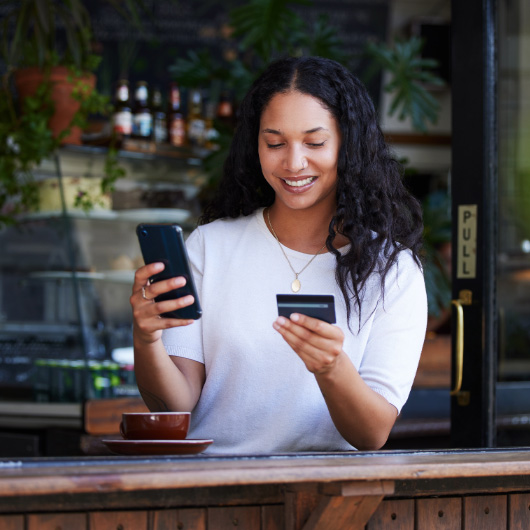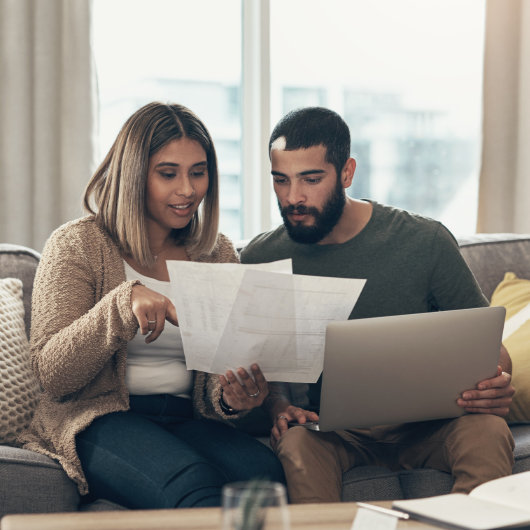Don't Have a Checking Account? Here's Why You Should Consider Opening One
Don't Have a Checking Account? Here's Why You Should Consider Opening One
If you rarely or never use a bank for your financial needs, then you may wonder, Do I need a checking account? Most American households — 94.6% — have at least one checking or savings account with a bank or credit union. The reasons are simple: They want to keep their money safe and have a convenient way to manage it.What exactly is a checking account? It’s a bank account that allows you to deposit money so that you can pay bills, make purchases and withdraw funds using a debit/ATM card or checks (provided to you once you open the account), or through online transfers.
The benefits of a bank account vs. alternative financial services
If you rely on check-cashing companies, payday lenders, pawn shops or other alternative financial services providers when you need to pay a bill, cash a check or purchase a money order, then you are probably paying high fees for every transaction. Check-cashing outlets, for example, typically charge 1% to 4% of the check’s face value. That means you could be paying as much as $12 or more to cash a $300 check. Research from Brookings shows that fees from alternative financial services can amount to $40,000 over a lifetime. Banks, on the other hand, don’t charge fees for their account holders to cash checks. When you cash a $300 check, you get to keep $300. If your employer offers direct deposit, you can even have your paycheck deposited electronically into your account so you don’t have to be concerned with carrying around or cashing a check every payday.
Money deposited into a checking account is protected (up to $250,000), as long as your bank is FDIC-insured. The FDIC, or Federal Deposit Insurance Corporation, is an independent agency of the U.S. government that was formed to protect account holders from losing their bank deposits. You can find out whether a certain bank is FDIC-insured here.
Additionally, opening a checking account provides you with 24/7 online and mobile access to your funds. Online and Mobile Banking allow you to easily check your balance, deposit checks remotely, pay bills and even send money electronically to friends and family.
How to open a bank account
Are you ready to open a checking account? Make sure to compare the features, costs and deposit requirements of various checking accounts online or by talking with a local bank representative to find the best account(s) for your needs. You can typically open a checking account online or by visiting or calling a bank branch in your community.
The process to open an account online varies by financial institution. To avoid frustration, carefully review any instructions provided before you begin to ensure you have all of the required information on hand. You may be asked to provide a debit card number or an account number from an existing bank account to open an account online. If you’d like to open your account with cash, visiting the branch to open your account is the best way to do so.
Be sure to take your driver’s license or other government-issued ID card with you (non-drivers can get a state ID card at the Department of Motor Vehicles office) and be ready to provide basic information such as your birth date, phone number, and Social Security or Taxpayer Identification Number. Also, make sure you have enough cash with you to cover the required opening deposit.
Access affordable bank accounts by looking for Bank On certification
Which banks offer basic bank accounts that are affordable and safe? To help consumers find a low-fee account, an organization called Bank On reviews checking accounts and certifies those that help protect consumers from high and unnecessary fees. What does Bank On certification mean? The Bank On program is committed to ensuring Americans have access to safe, low-cost financial products. They know that the money people spend on alternative financial services fees could instead be going toward household expenses or be put into a savings account, where it could earn interest to help individuals and families build their assets.
Certified Bank On bank accounts provide convenient and free tools for managing and tracking your money, while making sure your money is safe and secure. These accounts require no more than $25 to open, never have overdraft or minimum balance penalties, and you can set up account alerts to notify you when your balance is low. If you lose your debit card, you can lock the card remotely to make sure no one uses it without your permission. These features are provided for a total of $5 a month or less.
Dollar Bank’s No Overdraft Checking Account is certified by Bank On. It can be opened with a minimum of $25 and its monthly maintenance fee is just $5. Most importantly, it is a checking account with no overdraft fees (fees triggered by spending more than what is in your account). As an account holder, you get a debit Mastercard® or ATM card for purchases and ATM transactions, and have access to Online Banking and the Dollar Bank Mobile App, where you can view your account activity and balances, pay your bills and transfer funds electronically. A variety of other features, including text or email alerts, direct deposit and access to Send Money with Zelle® offer fraud protection, convenience and easy money management.
Tips for managing your checking account
Having a checking account can be a convenience, but it is also a responsibility. Building a few healthy habits around managing your checking account may help you avoid unnecessary fees and help you keep your account in good standing.
Here are three tips to remember:
- Never spend or withdraw money from your account unless you know you have enough in there to cover your purchase, payment or withdrawal. You can monitor your account balance (the amount of money in your account, which changes as you make deposits, purchases, payments and withdrawals) online or through your bank’s mobile app. Starting out with a checking account with no overdraft fees can also help keep provide an additional safety net to keep your account in check.
- Remember that money you deposit into your account is not necessarily available to you in its entirety immediately. Cash and direct deposits are available immediately, but check deposits are usually subject to the financial institution’s funds availability policy. Find out from your bank whether there is a “hold” period for money you deposit via check and, if so, when you can safely spend that money.
- Sign up for text or email alerts letting you know when transactions take place and when your account has a low balance. These alerts can easily be set up through online or mobile banking.
If you’re interested in learning about Dollar Bank’s No Overdraft Checking Account, visit us online or at one of our offices, or call 1-800-242-2265.
Certain transactions are not subject to decline. If any such transaction causes a negative balance, no overdraft fee will apply.
This article is for general information purposes only and is not intended to provide legal, tax, accounting or financial advice. Any reliance on the information herein is solely and exclusively at your own risk and you are urged to do your own independent research. To the extent information herein references an outside resource or Internet site, Dollar Bank is not responsible for information, products or services obtained from outside sources and Dollar Bank will not be liable for any damages that may result from your access to outside resources. As always, please consult your own counsel, accountant or other advisor regarding your specific situation.
Posted: May 20, 2022




